
WORKSHOP ON THE ECONOMICS OF PANDEMIC PREPAREDNESS
From the 19th-20th of June 2024 the Jameel Institute held their very first two-day workshop on the Economics of Pandemic Preparedness, alongside our colleagues from Umea University, Sweden.
This interactive workshop provided a platform for sharing and discussing ongoing and future research, ideas and projects with a focus on integrated economic and epidemiological modelling tools for improving pandemic preparedness. The workshop sessions were organised around three broad themes critical to various aspects of pandemic preparedness and response. Each theme covered multiple sessions wherein authors presented their work followed by a review from discussants:
- Policy-focused modelling approaches for pandemic preparedness
- Economic Impact of Public Health Interventions
- Social and Behavioural Aspects of Pandemic Preparedness
The Economics of Pandemic Preparedness Initiative (EPPI) team from the Jameel Institute and Umeå University, along with over 20 academics participated in the workshop. We were particularly delighted to welcome two fantastic keynote speakers for our inaugural workshop, Edith Patouillard from WHO and Aditya Goenka from the University of Birmingham. We were also pleased to be able to sponsor two participants from low to middle-income countries (LMICs) to join the workshop.
Workshop on the Economics of Pandemic Preparedness 2024 Report
Everyone enjoyed the workshop location near Nacka Strand close by the water, and we made the most of the long Swedish summer evenings with a lively and inclusive social program.
The 2025 workshop is planned for the 2nd-3rd June 2025, Nacka Strand, Stockholm. Submissions are now open and research papers for workshop presentation can be submitted HERE for consideration.
Workshop registration and the 2-day programme will be published online shortly. We hope to welcome many of you.
.jpg)
Healthcare, interrupted: Researchers and humanitarians unite to help strengthen health systems for emergencies
On Wednesday 20th November 2024, the Abdul Latif Jameel Institute for Disease and Emergency Analytics (Jameel Institute) highlighted their collaborative and interdisciplinary research approach through their annual research symposium, held at Imperial College London’s White City Campus.
This year’s theme of ‘Strengthening health systems for emergencies’ was centred on strengthening, evolving and adapting existing healthcare systems to be better prepared in the face of emergencies. This annual symposium reflects the Jameel Institute’s collaborative and interdisciplinary research approach with a series of talks, panel discussions and moderated breakout sessions on specific topic areas.
Colleagues from the School of Public Health, Imperial Business School, The George Institute and London School of Hygiene and Tropical Medicine presented research on how health systems are currently failing and evidence to support innovative solutions that help strengthen health systems for emergencies. Presenters and links to their presentations as follows: Dr Oliver Watson and Dr Bhargavi Rao; Prof. Helena Legido-Quigley ; Prof. Marisa Miraldo; Dr Margherita Molaro
The research set the scene for a diverse panel of humanitarian actors, academics and representatives from multilateral organisations from the World Health Organisation, Save The Children, Alliance for International Medical Action (ALIMA), United Kingdom Humanitarian Innovation Hub (UKHIH) and the Ukrainian Medical Charity. Chaired by Community Jameel Director, George Richards, the panel discussion explored how new and ongoing conflict, global public health emergencies and extreme weather events demonstrated the urgent need for health systems that could adapt and maintain equitable healthcare, even with unprecedented disruption. Special thanks to our panellists - Rachael Cummings | Humanitarian Director, Save The Children; Olivier le Polain | Unit Head, Acute Events Analytics, Health Emergencies Programme, World Health Organisation (WHO); Marine Vignon | European Partnerships Director, Alliance for International Medical Action (ALIMA); Sian White | Director, United Kingdom Humanitarian Innovation Hub (UKHIH): Oksana Lovochkina | CEO, Ukrainian Medical Charity; and George Richards | Director, Community Jameel (Panel Chair). To view the panel discussion, please watch here: Panel discussion.
Speaking to the event’s research and discussions, Jameel Institute Health Systems Research Lead, Prof. Tim Hallett, who acted as emcee for the day, said:
Undoubtedly, building stronger healthcare systems that are resilient in the face of emergencies is an ongoing process, heavily reliant on collaboration. The Jameel Institute 2024 Symposium was just that, bringing together academia, humanitarian and multilateral agencies to focus on solutions, understand lived experience, the ever-evolving challenges and the important role research can play in feeding into response, preparedness and resilience. In the face of sobering and insightful discussion, there is hope in the commitment, collaboration and innovation of those dedicated to ensuring resilient and equitable healthcare systems are available to all.
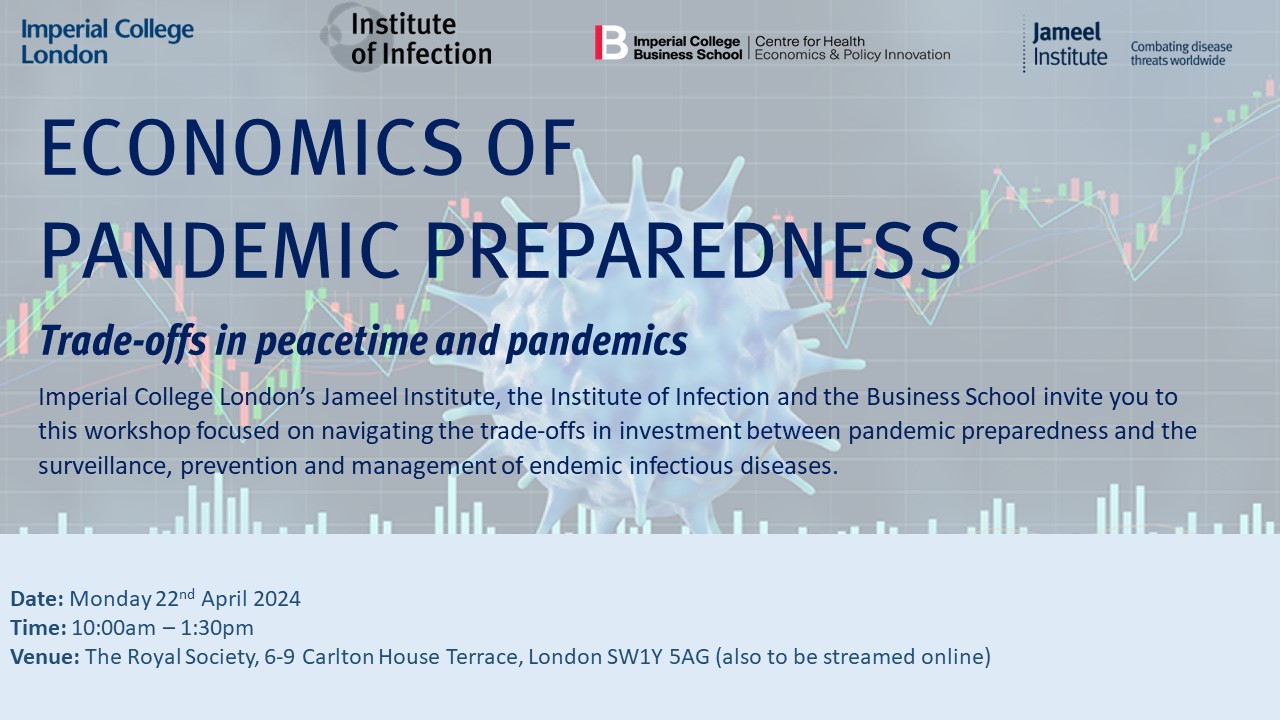
On 22nd April 2024, the Jameel Institute, the Institute of Infection, and the Centre for Health Policy and Innovation joined forces to collaboratively organise and host an exciting one-day discussion at the esteemed Royal Society on ‘The economics of pandemic preparedness: Trade-offs in peacetime and pandemics’.
READ THE 'ECONOMICS OF PANDEMIC PREPAREDNESS' SUMMARY REPORT HERE
The theme was the unmet need, highlighted in the COVID-19 pandemic, to analyse the complex trade-offs between public health and the economy.
Severe pandemics are uncommon and unpredictable, but election cycles of policymakers are short. The full benefits of investment in pandemic prevention and preparedness will extend well beyond election cycles, and even the lifetime of policymakers. And the question arises: in what to invest? The objective of this workshop was to hold a debate that informs policy and research priorities for pandemic prevention and preparedness, recognizing that budgets are limited, and tough choices must be made in the trade-offs between population health and the economy, as they vary between countries of differing income levels.
Focusing on navigating the trade-offs in investment between pandemic preparedness and the surveillance, prevention and management of endemic infectious diseases, the programme included talks from a range of organisational, multi-disciplinary and global perspectives including:
· Professor Jonathan Haskel (Bank of England, Imperial College London)
· Dr Edith Patouillard (WHO Dept. of Health Financing and Economics)
· Professor Els Torreele (WHO Council on the Economics of Health for All, UCL)
· Professor Susan Michie (UCL Centre for Behaviour Change)
· Dr Ifedayo Adetifa (General Director Nigeria CDC)
· Professor John Edmunds (LSHTM)
The robust presentations and discussions converged on certain critical points, in particular the principle that the most effective way of preparing for a pandemic is to introduce measures to protect the population against the spread of infectious diseases not only in epidemics and pandemics, but during 'peacetime', aka every day. Speakers also repeatedly emphasized the need for transdisciplinary collaboration, facilitated by metrics that can be used to convey the value of pandemic preparedness activities to economists.
Click to watch a recording of the event HERE. 
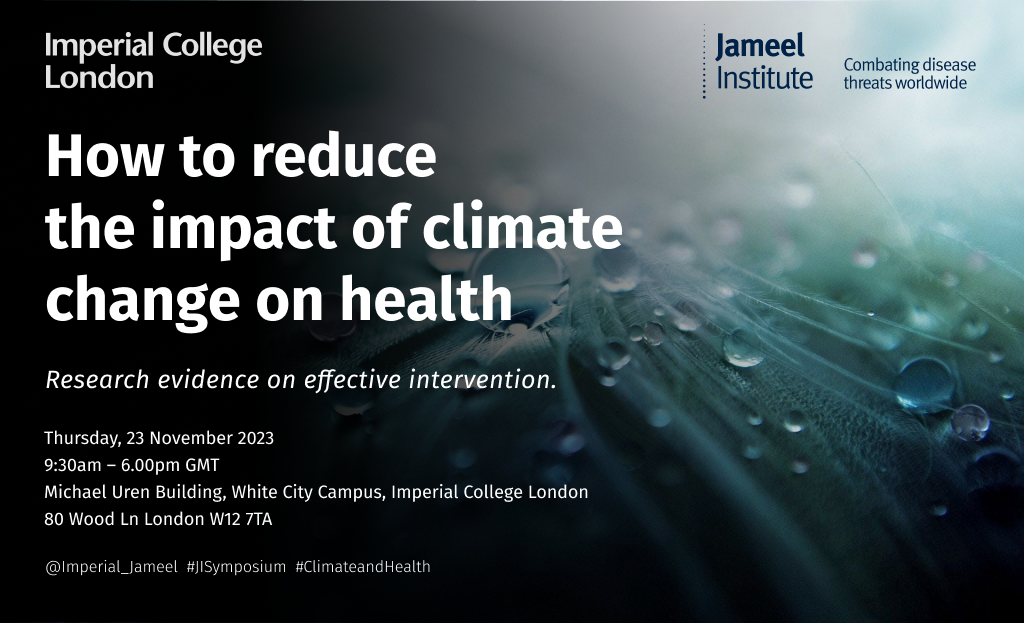
Brightest minds in climate and health join forces for Jameel Institute annual symposium
On Thursday 23rd November 2023, the Abdul Latif Jameel Institute for Disease and Emergency Analytics (Jameel Institute) highlighted our collaborative and interdisciplinary research approach through our annual research symposium, held at Imperial College London’s White City Campus.
This year, focusing on the theme of ‘Climate and Health’, Professor Neil Ferguson, Director of the School of Public Health and Jameel Institute, opened the event saying the symposium was striving to move beyond an analysis of the problem, towards finding interventions that work in protecting population health from the adverse impacts of climate change. The symposium’s aim was to show up any gaps in the current evidence on effective interventions and help design multidisciplinary research projects that address those gaps.
Research from Imperial College London colleagues was presented by Professor Ralf Toumi, Dr Kristine Belesova, Dr Laure de Preux, Professor Frank Kelly and Dr Ilaria Dorigatti. External experts from the commercial sector including the Commercial Director from AXA Health UK, Head of Investor Relations and Group Planning from Origin Enterprises and Head of Impacts and Adaptation from Wellcome Trust, joined us for a series of talks, panel discussions and moderated breakout sessions on specific topic areas.
Speaking to the day’s theme, Professor Katharina Hauck, Deputy Director of the Jameel Institute said: “The World Health Organization has estimated that between 2030 and 2050, climate change is expected to cause approximately 250,000 additional deaths per year, from malnutrition, malaria, diarrhoea and heat stress. It affects the social and environmental determinants of health – clean air, safe drinking water, sufficient food and secure shelter and will escalate infectious diseases. We see this area as a key priority in the work of Jameel Institute. We were thrilled with the turnout for this event and the compelling research and discussions that took place. Despite the concerning impacts of climate change, the day left us feeling uplifted at the innovative solutions and inspired approach to reduce risks associated with climate change.”
Attended by over 100 guests, the event received positive engagement and feedback and we look forward to conducting more in-person events going forward.
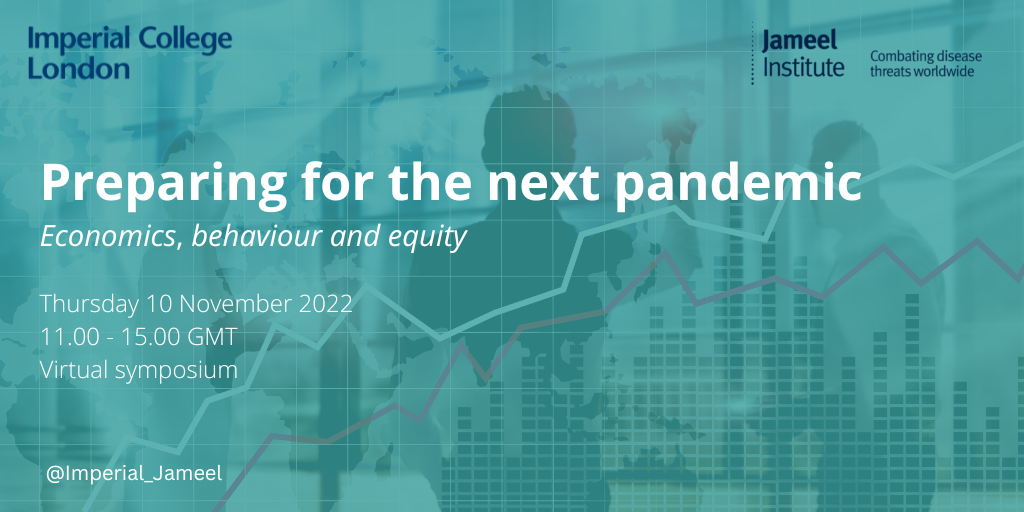
Past events
Since 2020, the Jameel Institute have been organising virtual events focused on COVID-19. Please see below for all for past events for you to watch again.
November 2022
'Preparing for the next pandemic: economics, behaviour and equity'
Our last annual symposium examined what COVID-19 has taught us and whether our assumptions prior to the pandemic were correct.
As the world begins to live with the endemic SARS-CoV-2, we explored how the lessons learned throughout the pandemic will enable us to manage and mitigate the economic and societal impacts of future pandemics. The panellists discussed questions on how we view the role of pandemic preparedness and how it could help us plan better for future outbreaks. We also discussed how human behaviour changed and adapted to respond to the crisis and what the impact was on the economy, but also on societal engagement and interactions. Lastly, the experts discussed what equitable access to healthcare meant in reality during the pandemic and what mitigation measures need to be in place to support the most vulnerable.
Watch the recording below:
Session 1 - Economics of pandemic preparedness
Session 2 - Behaviour interventions and the impacts
Session 3 - Inequality in a pandemic and the impacts
The symposium brough together esteemed panellists from a diverse range of backgrounds and from across the globe. This unique virtual event marked the second anniversary of the Jameel Institute which was founded in October 2019. Since the launch, the Institute has been largely focussed on analysing the impact of COVID-19 around the world. For all of our COVID-19 reports and planning tools, please see our COVID-19 resources page.
November 2021
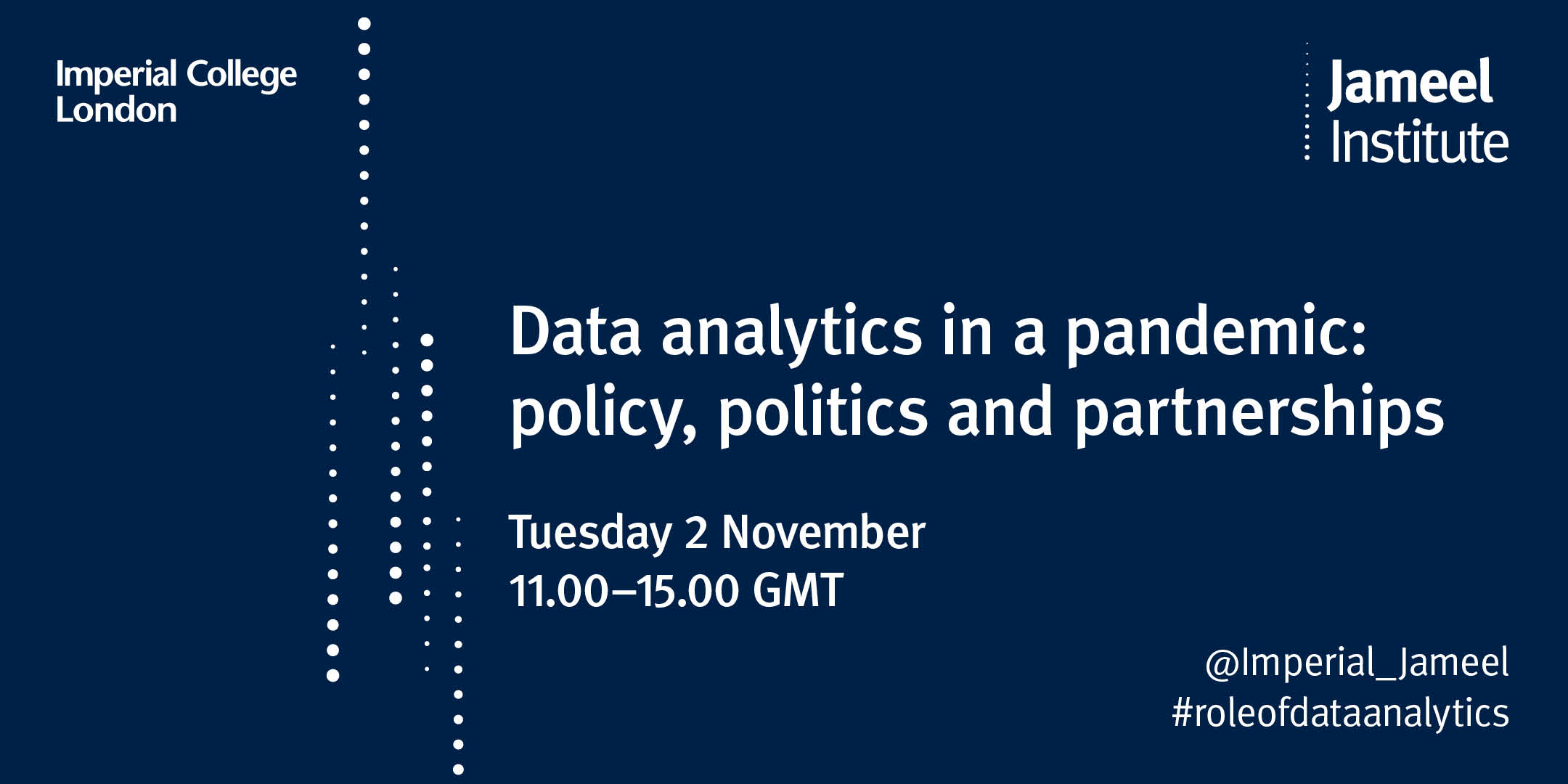
‘Data analytics in a pandemic: policy, politics and partnerships’ symposium
Thank you for joining our annual symposium which examined how data and the scientists that generate them have been politicised. We analysed the difficult and often fraught partnership between politicians, who answer to an electorate, and scientists, who uphold principles of good scientific conduct including objectivity and transparency. We also looked at how data has been communicated by the media and others over the last 18 months and the importance placed on data. Lastly, we examined what the successes and challenges have been around building effective partnerships between nations to ensure the mitigations strategies are equitable.
Watch the recording below:
Session 1 - Communicating science in the post-truth age
Session 2 - Data analytics at the science-politics interface
Session 3 - Partnerships and equity in the global response to COVID: success or failure?
May 2021

‘Where are we now? The Global COVID-19 vaccination programme’
The development of COVID-19 vaccines has presented the global community with many questions: how do we guarantee world-wide vaccine supply, what challenges do constrain health systems face with vaccine distribution, how are concerns over vaccine safety impacting uptake and what role has communication played in the vaccine rollout?
Watch our panellists discuss the learnings, challenges and opportunities faced over the last few months.
Speakers include:
Professor Azra Ghani - Chair in Infectious Disease Epidemiology, Imperial College London (Moderator)
Professor Anthony Harnden - Deputy Chair of the Joint Committee of Vaccination and Immunisation (JCVI), UK
Professor Heidi Larson - Founder of the Vaccine Confidence Project
Professor Julio Croda - Former Chief, Department of Communicable Diseases at the Secretary of Health Surveillance, Brazil between 2019-2020 and Associate Professor of Internal Medicine in the School of Medicine at the Federal University of Mato Grosso do Sul, Brazil
November 2020
'Shaping the post-COVID-19 world' symposium
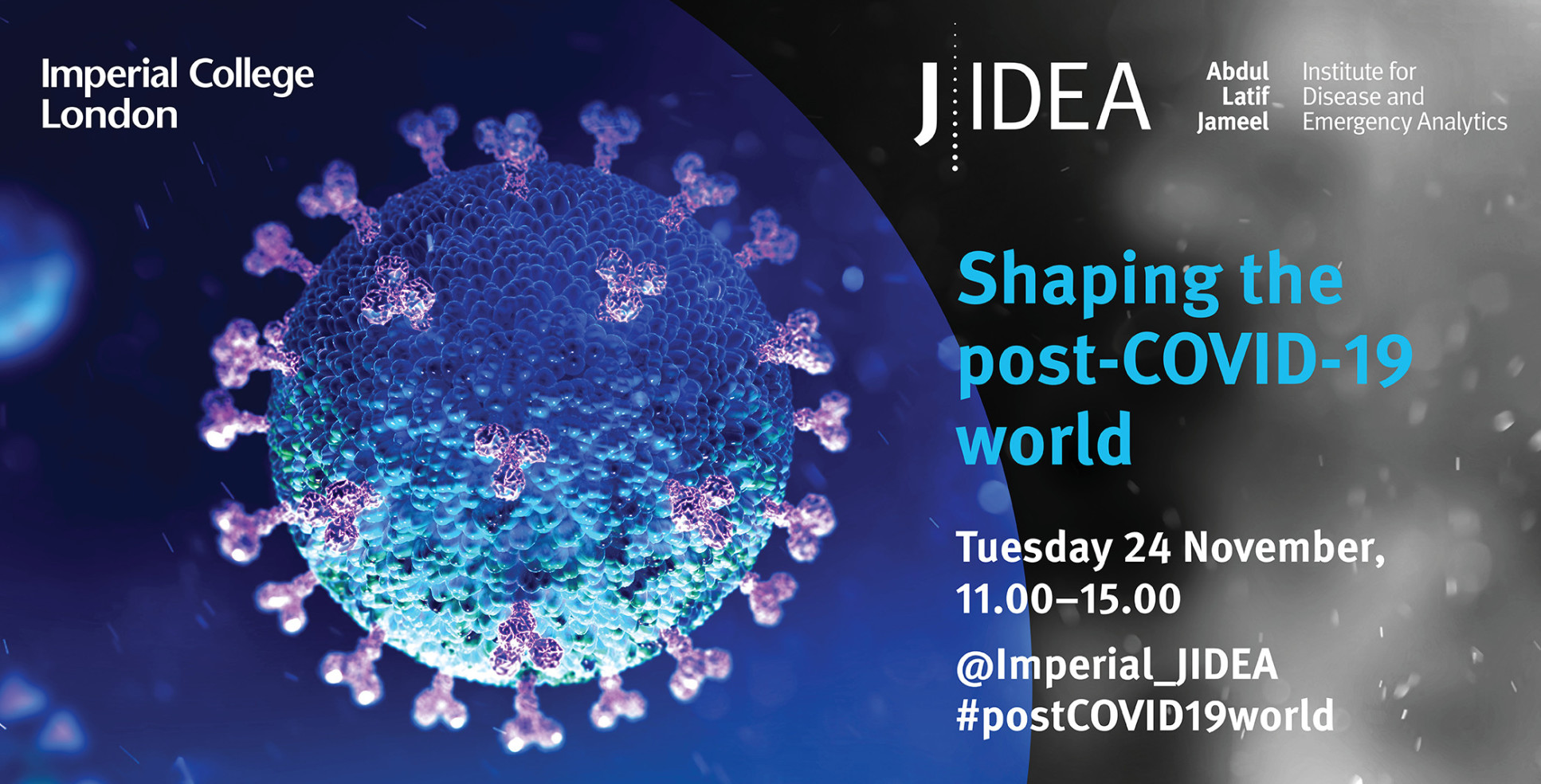
During these unprecedented times, we continue to learn how to control the virus, support and mitigate its economic and social impacts, and review how we can effectively prepare for pandemics in the future. Our symposium explored difficult lessons with views from central bankers, Nobel laureates, epidemiologists, public health policymakers. This unique virtual event marked the first anniversary of the Abdul Latif Jameel Institute for Disease and Emergency Analytics which was founded in October 2019.
Watch our Symposium 'Shaping the post-COVID-19 world' - YouTube. Since the launch, the Institute has been largely focussed on analysing the impact of COVID-19 around the world. For all of our COVID-19 reports and planning tools, please see our COVID-19 resources page.